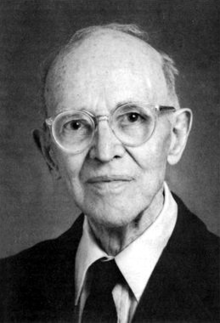Charles Hartshorne
| Charles Hartshorne | |
|---|---|

Portrait of Charles Hartshorne circa 1990
|
|
| Born |
June 5, 1897 Kittanning, Pennsylvania |
| Died | October 9, 2000 (aged 103) Austin, Texas |
| Era | 20th-century philosophy |
| Region | Western Philosophy |
| School | Process Philosophy |
|
Main interests
|
Metaphysics, Philosophy of Religion, ornithology |
|
Notable ideas
|
Process Theology |
|
Influenced
|
|
Charles Hartshorne (/ˈhɑːrtsˌhɔːrn/; June 5, 1897 – October 9, 2000) was an American philosopher who concentrated primarily on the philosophy of religion and metaphysics. He developed the neoclassical idea of God and produced a modal proof of the existence of God that was a development of St. Anselm's Ontological Argument. Hartshorne is also noted for developing Alfred North Whitehead's process philosophy into process theology.
Hartshorne (pronounced harts-horn) was born in Kittanning, Pennsylvania, and was the son of Reverend F.C. Hartshorne. Among his brothers was the prominent geographer Richard Hartshorne. Charles attended Haverford College between 1915–17, but then spent two years as a hospital orderly serving in the US Army. He then studied at Harvard University, where he earned the B.A. (1921), M.A. (1922) and PhD (1923) degrees. His doctoral dissertation was on "The Unity of Being". He obtained all three degrees in only four years, an accomplishment believed unique in Harvard's history.
From 1923-25 Hartshorne pursued further studies in Europe. He attended the University of Freiburg, where he studied under the phenomenologist Edmund Husserl, and also the University of Marburg, where he studied under Martin Heidegger. He then returned to Harvard University as a research fellow from 1925–28, where he and Paul Weiss edited the Collected Papers of Charles Sanders Peirce v. 1–6 and spent a semester assisting Alfred North Whitehead.
...
Wikipedia
